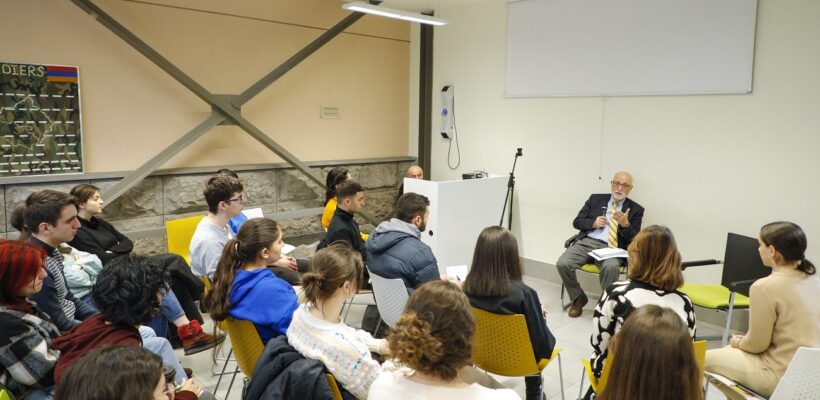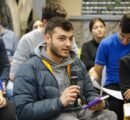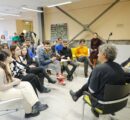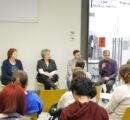
Interim President Holds Discussion with Student Community and Accreditation Task Force
3 min readYEREVAN, Armenia — On February 3, American University of Armenia (AUA) students participated in a discussion with AUA Interim President Dr. Armen Der Kiureghian and the University’s Accreditation Task Force comprising Accreditation Liaison Officer and Dean of General Education Dr. Sharistan Melkonian, Dean of the College of Science & Engineering Dr. Aram Hajian, Assistant Vice President Anahit Ordyan, and Director of the Office of Institutional Research and Assessment Dr. Brent Anders.
Dr. Der Kiureghian opened the session with a brief description of the process of AUA’s reaffirmation of accreditation with WASC’s Senior College & University Commission (WSCUC). He emphasized the importance of stakeholder involvement in the process, spotlighting AUA students as the most important stakeholder.
“One of the indications of the quality of a university is what percentage of students are engaged, what percentage of students care to respond to surveys and course evaluations, and what percentage are engaged in the workings of the university,” stated Dr. Der Kiureghian. “Your participation makes a difference, and we want to understand what motivates you to be engaged, why so many of you are not, and what we can do to encourage more active, constructive student involvement.”
The Interim President then asked students to share what they knew of the different ways to interact with AUA processes. Students offered a range of ideas, including serving on committees, participating in Student Council and various extracurricular activities such as clubs and organizations, as well as providing feedback through end-of-course evaluations and online student surveys (freshman entry/exit, undergraduate graduating, and graduate graduating).
Dr. Der Kiureghian continued the dialogue by asking students to share some of the reasons why their participation in end-of-course evaluations was lower than expected. He explained that course evaluations are especially helpful to continually improve curriculum, content, and teaching and learning. Students cited the excessive length of surveys and insufficient time allotted as barriers to completing them. Students also offered suggestions on ways to improve response rates, such as giving students an extra week to complete evaluations, as well as allocating class time to complete or at least start these end-of-course evaluations.
Some students also mentioned not being motivated to complete course evaluations and surveys because they didn’t fully understand their purpose, and how the results are compiled or used.
Members of the Accreditation Task Force facilitated a follow-up discussion on ways to encourage student participation across campus. Students responded with suggestions, such as incorporating reminders in Moodle and putting up flyers and posters around campus.
The focus then turned to the issue of school spirit. Many students expressed that they very much wanted to develop a greater school spirit at the University. “We need to be able to buy merch [merchandise]!” exclaimed one student. Several others reiterated that they wanted to be able to buy AUA t-shirts, hoodies, and other branded items in order to wear their support for and camaraderie with the AUA family. “Even my family in Los Angeles is always asking me to buy AUA shirts for them, but I can’t since the University doesn’t have any for sale,” noted one student. Students even shared some design and fashion possibilities for AUA merchandise.
Another topic discussed dealt with preferred methods of communication to better inform students about possible engagement opportunities. One student explained that some students are still developing their professional communication skills, and therefore have not fully learned to regularly check their emails; therefore, email might not be the best means of communication. Alternative communication methods were suggested, including visual reminders around campus as well as a push to use the new intranet system.
Students shared additional thoughts regarding their AUA experience, noting that they hoped growth plans included creating more space for both individual and group studying and socializing throughout campus.
Dr. Melkonian ended the session by thanking the students for their constructive feedback.
Although the session was focused on soliciting student feedback, it was also used as an opportunity to inform students about AUA’s ongoing reaffirmation of accreditation activities. The AUA accreditation self-study is on track for completion in the coming months.
The reaffirmation of accreditation timeline:
- Self-study conducted, Summer 2022-Spring 2023
- Self-study draft report shared with AUA community, late Spring 2023
- Finalized self-study report submitted to WSCUC, Summer 2023
- WSCUC site visit to AUA, October 24-26, 2023
- WSCUC site visit team report, December 2023
- WSCUC Commission action, February 2024
Additional information about AUA and its American accreditation can be found at https://aua.am/accreditation-affiliations.
Founded in 1991, the American University of Armenia (AUA) is a private, independent university located in Yerevan, Armenia, affiliated with the University of California, and accredited by the WASC Senior College and University Commission in the United States. AUA provides local and international students with Western-style education through top-quality undergraduate, graduate, and certificate programs, promotes research and innovation, encourages civic engagement and community service, and fosters democratic values.



